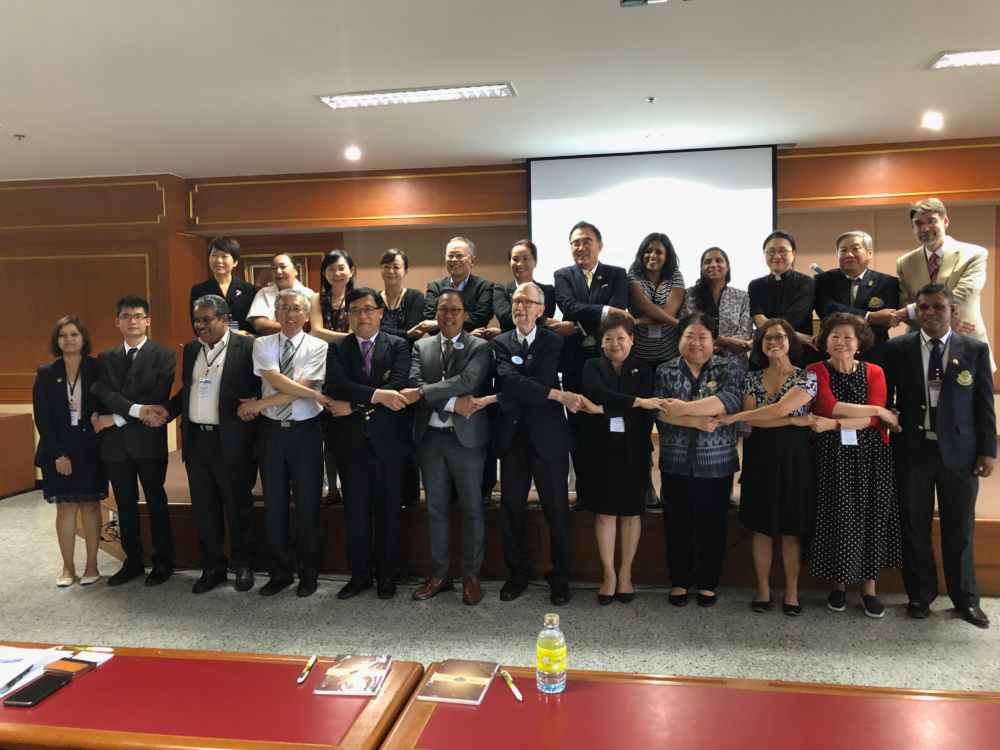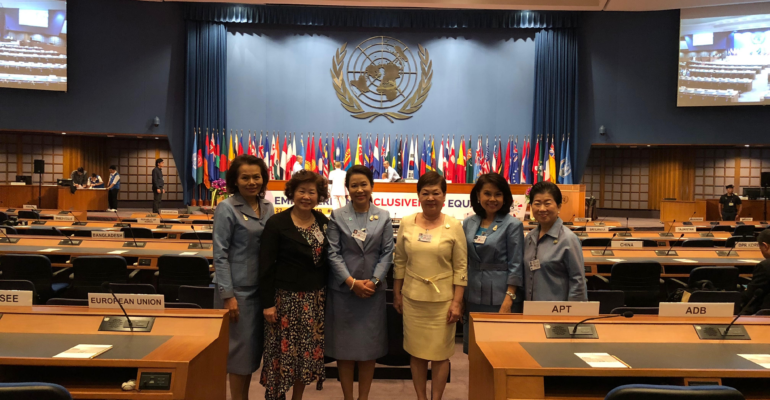A report by Helen Yang, Soroptimist International of the Americas (SIA), Taiwan Region
Helen Yang from SIA Taiwan Region was invited by PPSEAWA (Pan-Pacific and Southeast Asia Women’s Association) Thailand to participate in the 75th session of the United Nations ESCAP (Economic and Social Commission for Asia Pacific) and CoNGO’s RCAP (Regional Committee in Asia-Pacific) session. This is Helen’s first time to attend ESCAP and RCAP, and she was much impressed and inspired.
“The 75th session was held from 27 to 31 May 2019 at the United Nations Conference Centre (UNCC), in Bangkok. It was comprised of a ministerial segment, held 27 to 28 May, and a senior official segment, from 29 to 31 May. Over 800 delegates from 48 member states and associated members attended the session with permanent observes, UN agencies, NGOs, and CSOs.
“Empowering people and ensuring inclusiveness and equality” was the theme this year with special focus on three of the six UN Sustainable Development Goals under review, namely Goal 4 on quality of education, Goal 8 on decent work, and Goal 10 on reducing inequality.
Her Royal Highness Princess Maha Chakri Sirindhorn of Thailand delivered a special address, sharing her views and experiences on addressing various dimensions of human development through numerous Royal Projects, such as food security, health, nutrition, education, job opportunities, statelessness, forest, and environment conservation. She pointed out the importance of a people-centered approach to sustainable development. “People who live in underdeveloped areas also deserve to be happier and live better,” she said.
 A flagship report ‘Closing the Gap: Empowerment and inclusion in Asia and the Pacific’ launched to coincide with the annual meeting, assessing whether disadvantaged groups such as rural populations, persons with disabilities, and women, have been effectively included in development. It shows that disadvantaged groups have benefited from economic growth and social progress in several countries. There are positive signs of empowerment in education with secondary completion rates for rural residents now on par with urban dwellers. Encouragingly, women’s completion rates have caught up with those of men.
A flagship report ‘Closing the Gap: Empowerment and inclusion in Asia and the Pacific’ launched to coincide with the annual meeting, assessing whether disadvantaged groups such as rural populations, persons with disabilities, and women, have been effectively included in development. It shows that disadvantaged groups have benefited from economic growth and social progress in several countries. There are positive signs of empowerment in education with secondary completion rates for rural residents now on par with urban dwellers. Encouragingly, women’s completion rates have caught up with those of men.
This annual session has provided the opportunity to review, discuss findings, make recommendations, and conclusions for future work with the adoption of nine resolutions aimed at strengthening regional cooperation and partnerships towards achieving the 2030 Agenda for Sustainable Development.
Visit ESCAP to view the report ‘Closing the Gap: Empowerment and inclusion in Asia and the Pacific’ HERE

The Regional Committee in Asia-Pacific (RCAP) session was held on 29 May to 30, 2019, with a total of 20 organisations participated in the session. Three representatives from the Conference of NGOs in Consultative Relationship with the United Nations (CoNGO) presided over the session, including President Liberato Bautista, and first Vice President Cyrill Ritchie. The RCAP 2019 examined case studies by NGOs/CSOs on the implementation (regional, national and local), of six Sustainable Development Goals (SDGs 4, 8, 10, 13, 16, 17) that were to be reviewed at the UN High-Level Political Forum at the UN Headquarters in July 2019. RCAP 2019 took place at Siam University, Bangkok. Events were in University Building 19. An exhibition space was in the same building.”

